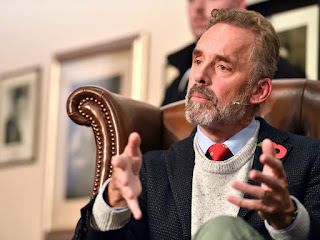Summarizing Chapter 1 "Maps of Experience: Object and Meaning" Peterson starts off with this:
"The world can be validly construed as a forum for action, or as a place of things."
After that statement and the fuller chapter summary, Peterson shares some lines, which seem to be set as blank verse. The formatting below, which is a bit baffling, is as it appears in the book:
We need to know four things:
what there is,
what to do about what there is,
that there is a difference between knowing what there is, and know-
ing what to do about what there is
and what that difference is.
We're going to, in the coming posts, get a whole lot deeper into all this, but some introductory things can be said right here.
First, Peterson makes a strong contrast between seeing the world as "a place of things" or as "a forum of action." This contrast is absolutely central to understanding his thought. Seeing the world as "a place of things" is how science and materialism view the world. The cosmos is a space filled with objects. The world is a warehouse full of furniture.
And yet, while science is great at telling us all about "what there is" it struggles to tell us "what to do about what there is." Science doesn't create for us "a forum of action."
That insight sits at the heart of Peterson's criticism of atheism. Materialism doesn't create for us a forum of action. Materialism knows "what there is" as it investigates and describes the world as "a place of things." But materialism fails to tell us "what to do about what there is." To act we need more than an exhaustive empirical inventory of the furniture of the cosmos. A forum of action requires more than brute physical description. A forum of action involves knowing not just what a thing is, scientifically speaking, but the value and meaning of a thing. And meaning and value are the very things that escape the scientific, materialistic gaze. This is why an atheistic materialism fails to help us: it cannot create a forum of action.
Again, I'm going to share more about Peterson's view of meaning and value in the posts to come, but I want to stop here to make another comment about Peterson's mass appeal.
Specifically, Peterson describing the world as a "forum of action" is one of his major themes. Over and over again Peterson comes back to a central message: "You must act." This is Peterson's soapbox and bully pulpit.
Do you want to debate the existence of God? Waste of time. You must act.
Do you want to debate if goodness can exist without God? Doesn't matter. You must act.
Do you want to blame your parents or the government for your problems? Won't make a difference. You have to act.
Peterson has an uncanny ability to blow past most of the obstacles that hang us up, from interminable metaphysical debates to getting stuck in neurotic quicksand. Peterson pushes it all aside to come back to his central point: You must act. Life is a forum of action, and you can't escape its imperatives. You must act. And don't kid yourself that before you have to act that you'll get it all figured out, all your ducks in a row, be those ducks philosophical preoccupations or psychological hangups. You don't have that luxury. You don't have the time or ability to answer the questions you're asking yourself. And while you are lying there ruminating, trying to determine if you have free will or not, your alarm has gone off and the day has started. Get up. You're going to be late for work. People are depending upon you. You are depending upon yourself. Life isn't waiting around for you. You must act.
Given this pressing focus upon action, there is an urgency and pragmatism at the heart of Peterson's approach. The urgency is felt in the demand for action, especially given the high stakes of life (see last week's post). And the pragmatism is felt in how Peterson ignores metaphysical debates to focus upon choice and behavior.
God might exist or not. But that is a metaphysical quibble that misses the deeper point. The point is that God creates a forum of action. The question of God isn't about what there is. The question of God concerns what to do about what there is.


